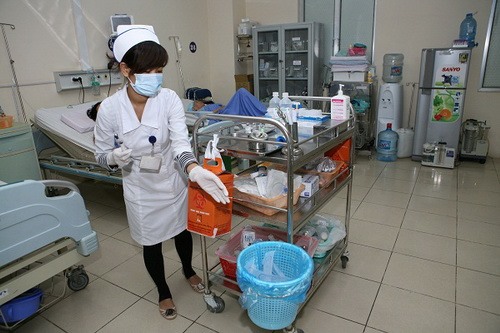 Society
Society

Hospitals and clinics in Việt Nam have started implementing surveillance of nosocomial infections and monitoring the hospital-infection control process, Deputy Minister of Health, Nguyễn Viết Tiến said .
 |
| Hospital-infection control needs to be taken seriously.—Photo suckhoedoisong.vn |
HÀ NỘI -- Hospitals and clinics in Việt Nam have started implementing surveillance of nosocomial infections and monitoring the hospital-infection control process, Deputy Minister of Health, Nguyễn Viết Tiến said at Tuesday meeting.
Measures include the monitoring of hand hygiene compliance, hospital microbial surveillance and antibiotic resistance, step by step standardisation of disinfection, hospital hygiene improvement, and disease prevention, Tiến added at the meeting organised by the Health Ministry in Hà Nội this week that aimed to implement the new Circular on hospital-infection control regulations.
The Ministry of Health has just issued Circular No.16/2018 that regulates hospital-infection control, to replace the previous Circular No.18/2009.
The Ministry of Health’s Medical Examination and Treatment Department director Lương Ngọc Khuê said according to the new circular, hospitals with over 150 beds must have a hospital-infection control department, and hospitals with under 150 beds must have an infection control office with full-time staff.
“The head of the hospital must be fully responsible for hospital-infection control plans,” Khuê said.
“Full-time supervisors, disinfectants and sterilisers must have Ministry of Health certificates or degrees in hospital-infection control (with training time of three months).”
Khuê added the new circular also suggested hospitals seek investment and funding from different sources to develop hospital sanitation measures and waste treatment under the professional control of the hospital-infection control department.
“The circular is an important step to determine hospital-infection control work as a key task of the health sector.”
However, Deputy Minister of Health, Nguyễn Viết Tiến acknowledged that the work of hospital-infection control in Việt Nam still faced many challenges.
At some clinics, management has not yet fully understood the role and importance of hospital-infection control work, so investment has not been appropriate or effective, according to Tiến.
“Human resource management for hospital-infection work is inadequate and weak in contributing to the effective prevention and control of antibiotic resistance, medical complications, and of contagious disease,” Tiến said.
In particular, with the development of diseases in developing countries, including Việt Nam, infectious diseases accounted for a high proportion with many newly-emerging diseases bringing a high risk of death, occurring not only in communities but also in hospitals, such as influenza A (H5N1, H1N1, H7N9), MERS-CoV and Ebola, according to the deputy health minister.
This was one of the major challenges facing the health sector’s hospital-infection control work.
According to the Ministry of Health, the ratio of patients suffering from hospital-acquired infections in Việt Nam ranges from 4-8 per cent of total patients being treated at hospitals.
In fact, there have been a number of wide-spread cases, including the measles outbreak in 2014 that infected many children being treated at the Hà Nội-based National Hospital of Paediatrics.
In November, 2017, a hospital-acquired infection case at the Bắc Ninh obstetrics and maternity hospital killed four babies, and many others were infected with various levels of severity.
In June, 2018, many children in Điện Biên’s Đông District were also infected with measles after being treated at a district health clinic.
There are many risks of infection in hospitals, including from drinking water, toilets and medical equipment. To ensure the hygiene and safety of patients, many hospitals have installed soap, clean bed sheets and toilets to prevent infections.
Nguyễn Tấn Hòa, 54, from Đồng Nai was taking care of his wife, a cancer patient at HCM City Tumour Hospital, saying “There are free water bottles, which is good for patients and their family members. But in a crowded hospital, with all kinds of sickness, bottles should be cleaned thoroughly.” -- VNS




